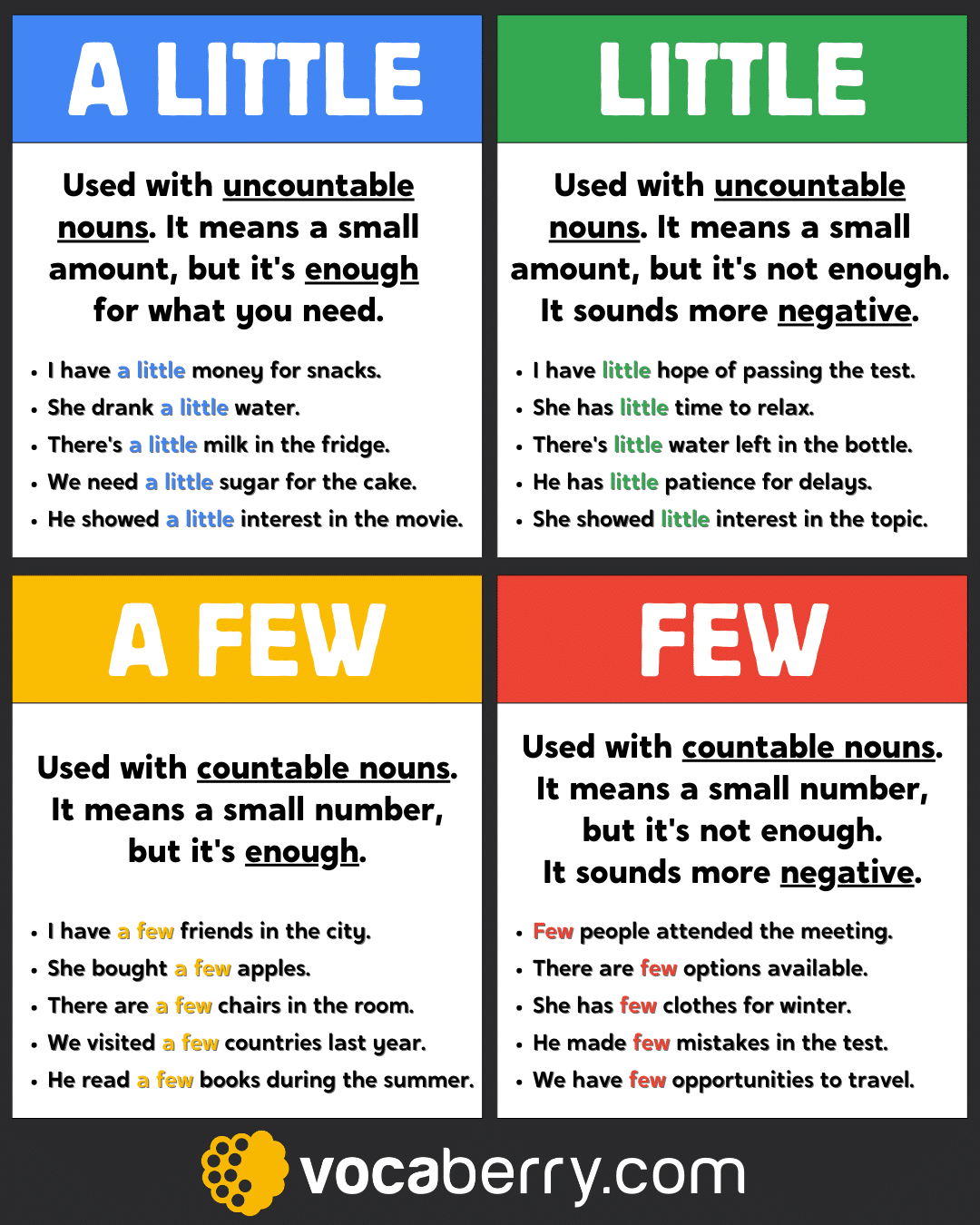
In English, a little, little, a few, and few are used to describe small amounts of something, but they are used differently depending on whether the noun is countable or uncountable.
Understanding these words will help you communicate more accurately when talking about quantities.
| Phrase | Used With | Meaning |
|---|---|---|
| A little | Uncountable nouns | Some, but not much (positive) |
| Little | Uncountable nouns | Almost none (negative) |
| A few | Countable nouns | Some, but not many (positive) |
| Few | Countable nouns | Almost none (negative) |
Now, let’s explore each one in detail with examples and grammar rules.
A Little vs. Little (Uncountable Nouns)
A Little
A little is used with uncountable nouns such as water, sugar, money, and advice. It means some, but not much, and suggests that there is enough of something.
Examples:
- We have a little time left before the train arrives. (Some time, enough to do something)
- Can I have a little milk in my coffee? (Some milk, not too much)
- She speaks a little Spanish. (Some knowledge of Spanish, but not fluent)
Little
Little is also used with uncountable nouns, but it has a negative meaning. It means almost none, not enough, and suggests that there is too little to be useful.
Examples:
- There is little hope of winning the match. (Almost no hope)
- He has little patience with children. (Almost no patience)
- We have little water. (Almost no water, not enough)
A Few vs. Few (Countable Nouns)
A Few
A few is used with countable nouns such as books, apples, chairs, and friends. It means some, but not many, and suggests that there is enough of something.
Examples:
- I have a few good friends. (Some good friends, not a lot, but enough)
- We need a few chairs for the meeting. (Some chairs, enough for the people attending)
- She bought a few oranges from the market. (Some oranges, not a lot)
Few
Few is also used with countable nouns, but it has a negative meaning. It means almost none, not enough, and suggests that there are too few to be useful.
Examples:
- Few people came to the event. (Almost nobody)
- He has few ideas for the project. (Almost no ideas)
- There are few buses at night. (Not enough buses)
Summary of the Differences
| Phrase | Type of Noun | Meaning | Example Sentence |
|---|---|---|---|
| A little | Uncountable | Some, enough | We have a little milk left. |
| Little | Uncountable | Almost none, not enough | There is little time to finish. |
| A few | Countable | Some, enough | I have a few books to read. |
| Few | Countable | Almost none, not enough | Few people attended the meeting. |
Quiz: A Little, Little, A Few, Few
1. There is ______ water in the glass, so you can still drink it.
a) A few
b) A little
c) Few
2. She made ______ mistakes in her homework, but overall, it’s correct.
a) A few
b) Few
c) A little
3. There are ______ people at the party, it looks empty.
a) A few
b) Few
c) Little
4. He has ______ patience with noisy children.
a) A little
b) Few
c) Little
5. We need ______ more minutes to finish the project.
a) A little
b) A few
c) Few
6. I have ______ friends in this city. I am not lonely.
a) A little
b) A few
c) Few
7. She knows ______ French, but not enough to have a full conversation.
a) A little
b) Few
c) A few
8. There is ______ hope left. We must keep trying.
a) Little
b) Few
c) A little
9. We have ______ chairs left in the storage room.
a) A few
b) Few
c) Little
10. I put ______ sugar in my tea. It’s not too sweet.
a) Few
b) A little
c) A few
Quiz Answers
1) A little
2) A few
3) Few
4) Little
5) A few
6) A few
7) A little
8) Little
9) A few
10) A little






